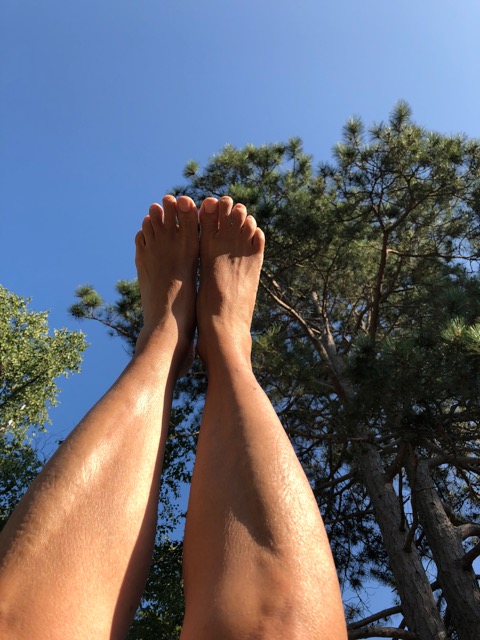By Laurel Decker Hogge
I’m over a mile into my morning jog… the distance it takes for my body to stop complaining and just let the endorphins do the work. Pink is turned up all the way in my headphones, and my feet are locked in with the beat. I’m in the best mood. So I’m not even annoyed as I near a crosswalk and slow down just in case I have to wait for oncoming traffic.
A car approaches, and I hear a short honk. Interpreting it as a warning that they intend to keep moving, I completely stop to show that I’m not going to run in front of their car. They give another little honk, and I realize it’s a friendly nudge telling me to go ahead and cross. They stop. I wave a quick “thank you” and resume with Pink and endorphins.
I’m a few strides away from the crosswalk when I hear another horn. This one is louder and held longer, and it’s coming from the big black truck that had to stop behind the driver who kindly waited for me to cross. The guy driving the truck was not in the mood for all of this small town politeness.
Feeling a bit stunned by the noise, I try to figure out if he was angry at me for crossing, or angry at the person who stopped in front of him to allow me to cross. As the truck’s engine revs to pick up speed, I turn my body fully toward the angry man, spread my arms out dramatically, and yell, “REALLY?! IT’S A CROSSWALK!!!” He keeps driving. I go back to jogging. But now I am very annoyed because that dude just killed the blissful high I built up in my first mile. But then I feel a new rush building inside me.
I had just done something I would have never imagined doing two years ago. I just spoke up for myself. No—I yelled up for myself—at a big man who was angry that I inconvenienced him. Without any fear whatsoever, I had turned my 5’5” body straight toward him and exclaimed that I had a right to be on that crosswalk and a right to make him wait for me.
As my feet find a cadence with the beat once again, I think about the past two years. Two years of transition out of a fundamental religion that had formed the core of my identity for 38 years. Growing up in a community established by my Mormon pioneer ancestors, I proudly believed my life’s purpose was to be worthy of eternal approval from God. And to earn that approval, I needed to follow the direction of men appointed to speak for Him as prophets and leaders. I felt privileged to have such specific instruction on how to be a righteous young woman, knowing it would prepare me to marry a righteous young man in a Mormon temple.
Everything went as planned, and I met him at Brigham Young University. In a temple marriage ceremony, my husband was given the responsibility of keeping me on the path to eternal salvation. Together we observed the counsel to have as many children as possible, and the first of our four kids was a honeymoon baby. Throughout our marriage, we continued attending multiple weekly church meetings, following guidelines on how to dress, paying tithing, avoiding swear words, and never drinking alcohol or coffee.
Read related article: Empowerment—The Healing Journey of Finding and Living Your Truth
I still find it hard to explain why I allowed myself to examine my deeply-rooted beliefs. It’s even more difficult to explain the complete collapse of my sense of identity once I realized I could no longer hold those beliefs. As I tried to embrace new freedoms and release familiar habits, I felt like a stranger to myself. It was during the darkest time in my faith transition that I first walked into a yoga studio.
My eyes followed the canvas-white walls from one pretty decorative accent to another, finally landing on a shelf of rolled white towels with a cheerfully framed message urging everyone to “Please kindly take one f#*$%ing towel.” I blushed out of pious reflex as I took one f#*$%ing towel and turned toward the yoga room door.
Pulling my mat closer to my chest, I tried to politely push through the crowd of strangers blocking the entrance to where I would find dark and quiet safety. I tried not to seem out of place as women all around me chattered, hugged, and excitedly greeted each other. I kept encouraging myself not to turn around and leave, and told myself that just past that door I could roll out my mat and be alone.
I was making slow progress toward the door when I found out what was holding everyone up. Right at the entrance was a woman laughing hysterically and hugging people. Her energy was massive. It was loud. My first response was to be annoyed by her and all of these noisy, affectionate, happy women. My reaction was confusing, but at that time I felt like nothing made sense.
In the following months I went to many excruciating therapy sessions with a woman who guided my healing process without judgment. I spent a lot of time in nature, learning a new foundation for personal spirituality. I attended yoga religiously. I did all of these things not only because I needed the physical momentum to keep from giving in to depression, but because I was determined to make sense of the chaos inside me. To fix the broken, to turn and face my fears directly so I could release them, and to move forward into spaces where I knew I belonged.
Through my own healing process, I bonded with other women bravely doing their own soul work. I came to understand my first experience in the studio when I felt an aversion to the energy of the women around me and wanted to be in my own silent space. Emotional pain is hard to articulate, and I felt I couldn’t possibly be understood. But over time, as I vocalize my experiences, I rediscover lost pieces of myself. It was in a therapy session that I casually explained that I had taken an oath when I was 21 years old to “avoid all light-mindedness and loud laughter.” I never considered Mormonism strict or difficult to live, but my high school friends and college roommates would tell you if there was ever loud laughter happening, I was usually involved.
Over time I was able to stifle my sense of humor just enough to keep from feeling guilty for not observing that oath. In my transition away from my religion, I enrolled in yoga teacher training with hopes of rebuilding my personal spirituality. It was lead by the same woman who proudly displayed a sign with the F-word in her studio, and who kept me waiting to enter the door that first day in her class. I had no idea that her dynamic, and sometimes inappropriate, energy was exactly what I needed to release that guilt. Today, hearing myself laugh hysterically with family and friends is just one reason I am grateful to be on this complex journey back to myself.
I’m nearing the parking lot, so I slow to a stop and begin recovery stretches. I love the way my breathing and pulse settle into a calm rhythm after a demanding workout. I inhale and clasp my hands behind my back, exhale, and fold forward. I allow my body to soften into this pose… heart open and head bowed… a lovely image of pride and humility. I am proud of my own courage to get to this point, and I am humbled by the women who helped to amplify my voice. I feel like a lioness who has just shown herself as a fearless monarch and is now resting contently among her pride. I smile to myself and recall that Leo is my astrology sign, and suddenly I’m curious about this animal.
I get into my car and do an internet search on “Why do lions roar?”…
Lions roar to tell other lions where they are… When lions greet each other and play together, they make lots of silly noises—like hums and puffs—to show they are happy. (lionalert.com)
Makes perfect sense to me. I exhale a peaceful hum and start my car to drive home.
Laurel Decker Hogge is a yoga instructor, artist, and wellness guide in Brighton. Laurel is passionate about helping others connect with their own intuition to live with focus and purpose. You can find out more at fourcornerswellnessguide.com.































































































































































































After my first journey to Santiago in June of 2002, I believed that a “real” pilgrimage could only be made in the traditional way, that is, the hard way. And for me, this meant eschewing the products and services that made it possible to avoid most of the Camino’s hardships. “Creature Comforts on the Camino, Part 1: Do Real Pilgrims Take Cold Showers?” addresses changes in the infrastructure that eased the way. Part 2 looks at the effect of technological advances on the Camino, specifically smartphones, email, and apps.